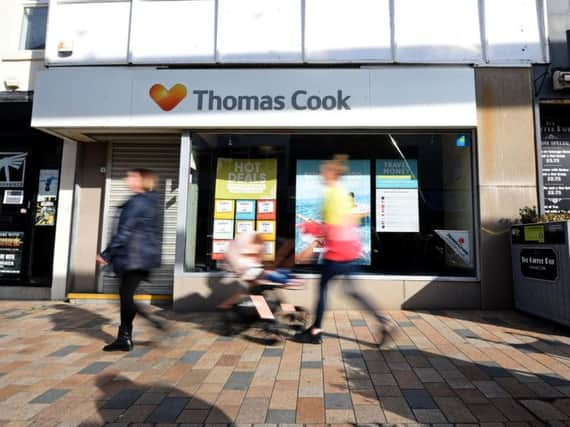Greg Wright: The factors that led to the collapse of Thomas Cook


Read more:
Full cost revealed of Thomas Cook repatriationThousands stranded as Thomas Cook collapses The Derbyshire cabinet maker was a canny businessman who spotted a lucrative opportunity for organising day trips aimed at temperance movement supporters. From these modest beginnings, Thomas Cook laid the foundations for one of the world’s largest tour operators, which ran hotels, resorts and airlines for 19 million people a year in 16 countries.
Mr Cook and his first customers from the temperance movement probably took a dim view of individuals and enterprises who failed to keep a grip on their finances. The company’s founder must be spinning in his grave after the humiliating collapse of the company that carries his name led to the UK’s largest peacetime repatriation,
Advertisement
Hide AdAdvertisement
Hide AdAn estimated 150,000 tourists are being brought home by the Civil Aviation Authority (CAA) in a flight programme costing £100 million.
Thomas Cook ceased trading after failing to secure a last-ditch rescue deal. It was unable to find the extra £200 million needed to keep the business afloat following a day of crucial talks with its major shareholder and creditors on Sunday. Thomas Cook has been brought low by a colossal debt pile that prevented it from responding to online competition.
Travel and tourism analyst Dr Neil Robinson, from the University of Salford Business School, believes Thomas Cook’s troubles did not emerge overnight.
He said: “The downturn in bookings post the Arab spring back in 2010, saw profits drop as people were reluctant to buy travel product associated with this region and the seeds of change for Thomas Cook and the wider travel sector were already being sown.
Advertisement
Hide AdAdvertisement
Hide Ad“Fast forward a few years and the sector has come under many pressures associated with very slim profit margins for each travel product sold; a possibility of too many players in an already saturated market,’’ Mr Robinson said. “One might argue that the product mix on offer at Thomas Cook did not align with what its customers really wanted.
“Their price, promotion and how people actually booked Thomas Cook holidays did not keep pace with changing technology and demand. For example, they still had a lot of high street outlets, which incur rental and other costs.”
Helal Miah, Investment Research Analyst at The Share Centre, said the group, like its peers, has suffered from a “perfect storm of turbulence”.
This storm included political unrest and terrorism at some of its most popular destinations and sizzling UK summers which encouraged more Britons to opt for staycations.
Advertisement
Hide AdAdvertisement
Hide AdThe ever-present Brexit uncertainty devalued the pound and put consumers off booking holidays, according to Mr Miah.
He added: “The group has also been too slow to adjust to the online world. While other travel groups have suffered from these factors, Thomas Cook’s pile of debt is the differentiating factor.
Mr Miah added: “These events reflect the damaging effects of too much debt for a company facing a host of geopolitical challenges, compounded by a management lacking forward vision.
“It highlights how investors need to be very wary of highly leveraged businesses and the dangers of trying to catch a falling knife.”
Advertisement
Hide AdAdvertisement
Hide AdThomas Cook joins the likes of Woolworths among the list of apparently “too big to fail” corporate names that have been swept away by changing consumer habits.
Thomas Cook’s collapse also provides a timeless warning about the dangers of burdening any business with too much debt.